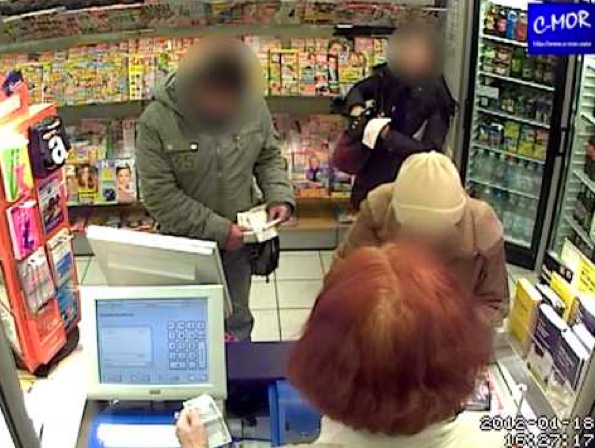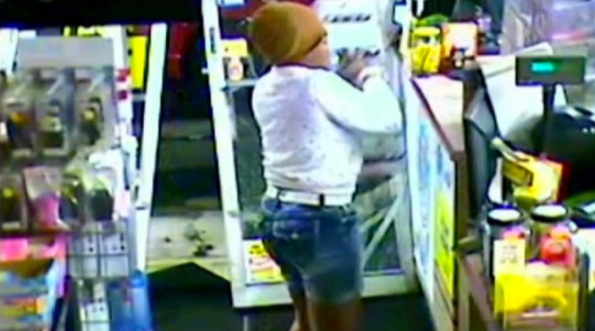How You Can Cheat The Lottery... But The Horrible Downside Is Not Worth The Risk
/ Relatives are getting in on family-owned lottery stores to beat the system.
Relatives are getting in on family-owned lottery stores to beat the system.
There's a big scam going on with some lottery retailers, and the Michigan Lottery Bureau is taking a close look at it.
 Jeff HolyfieldOf the 11,000 registered lottery retailers in Michigan, a small number are buying discounted tickets from winners who don't want to cash in their own for various reasons, said lottery spokesman Jeff Holyfield.
Jeff HolyfieldOf the 11,000 registered lottery retailers in Michigan, a small number are buying discounted tickets from winners who don't want to cash in their own for various reasons, said lottery spokesman Jeff Holyfield.

"There are some players, if they win, they might be on assistance and not want to claim a prize. They might owe back taxes," Holyfield said. "It would be one of those things where they would choose not to claim the prize themselves."
And that's not allowed. Retailers who break the rules can be put on probation with the lottery agency, fined or lose their permit to sell lottery games, reported Lauren Abdel-Razzaq of The Detroit News.
According to a state audit, 37 store owners turned in winning tickets worth nearly $3.6 million in 2012 and 2013. One retailer collected 107 prizes worth $346,312 in 2013.
Six store owners didn't report $509,211 in lottery winnings on their 2012 tax forms. The specific retailers under investigation were not named in the report.
Michigan law conceals the identity of people who win more than $10,000 in state games, such as the daily games, Lotto and scratch-offs, but winners in the multistate Mega Millions and Powerball games are named publicly.
Officials said 13 retailers were disciplined during the audit period.
The lottery is creating a database of retailers who cash in $20,000 or more, or at least $600 in prizes 20 or more times in a calendar year. The hope is that by tracking patterns, it will become easier to identify which retailers are violating the law and whom to investigate.
"If you look at the report, we agreed with the findings that we could do a better job in this area, and we're working on it," said Holyfield. "We will be conducting undercover investigations where we expect there is discounting and will respond appropriately."
 Terry StantonAs for the winners who solicit the help of retailers, it's difficult to catch them doing it, said Terry Stanton, spokesman for the state Treasury Department.
Terry StantonAs for the winners who solicit the help of retailers, it's difficult to catch them doing it, said Terry Stanton, spokesman for the state Treasury Department.
"The only way we'd find out is if lottery informed us," he said. "If we're made aware of the situation, certainly we would look into that and see if there was some offset or intercept that was needed."
At its most basic, the practice is tax evasion. But it would be hard to know who is behind it.
By law, lottery prizes above $600 are reported to the IRS and the Department of Treasury. The Lottery Bureau deducts taxes from winning tickets worth at least $5,000.
A prize of $1,000 or more triggers a check with the treasury to see if the winner owes back taxes, child support, unemployment reimbursement or other public debts or obligations. This is why many winners turn to store owners to cash in their prizes.
The state won't say if it is investigating anyone connected to a suspected scam. Stanton said the treasury doesn't discuss audit procedures or ongoing investigations.
"It's a relative handful of our retailers who are even suspected of doing this," he said.
Once a retailer receives a license, it's good for one year and is renewed automatically unless there's a problem. The bureau monitors sellers throughout the year to make sure they aren't violating the law and they are reporting their sales and winners.
 The Michigan Lottery, established in 1972, has provided nearly $19 billion to the School Aid Fund. In 2014, the lottery saw a record $2.6 billion in sales, which provided about $485 to each student in the K-12 public school system. It also provided $188.6 million in commissions to retailers.
The Michigan Lottery, established in 1972, has provided nearly $19 billion to the School Aid Fund. In 2014, the lottery saw a record $2.6 billion in sales, which provided about $485 to each student in the K-12 public school system. It also provided $188.6 million in commissions to retailers.
In the U.S., 44 states and the District of Columbia hold lotteries. The games brought more than $70 billion in sales in fiscal year 2014, according to the Ohio-based North American Association of State and Provincial Lotteries.
Michigan isn't the only state to investigate the suspicious winnings of lottery retailers.
Of New Jersey's 20 most frequent lottery winners since 2009, half were either licensed retailers or their family members, according to an investigation published in the Asbury Park Press in December.
Together, the winners collected about $1.8 million on 840 prizes and, in some cases, beat odds of 10,000-to-1.
Retailers across Southern California cashed in tens of thousands of dollars in winning tickets purchased at their stores, according to reports from CBS2 News in Los Angeles.
In an investigation published in March, the Palm Beach Post said many store owners or operators were repeat jackpot winners in Florida. Some cashed in tickets worth $600 or more every 11 days.
SOURCE: The Detroit News





































